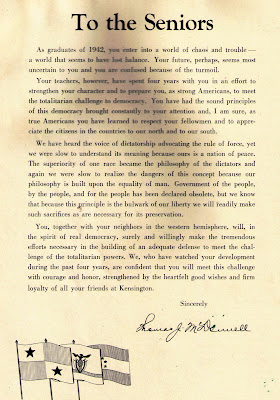The Kensington High School Yearbook of 1942 included a page featuring students who sold wartime "savings stamps," by means of which school-age kids could lend money at interest to the US Treasury for the war effort.
Dorothy Lamour was one of a number of Hollywood stars who supported the war effort in this way. She also starred in the "Road" movies with Bob Hope and Bing Crosby.
A teacher was called up from Reserves to Actives; students donated to the Red Cross; "seventy-five Seniors willingly gave their services during the days of sugar rationing"; students volunteered to work on farms in the summer; students collected books to send to USO libraries. Click to enlarge into Preview. Check out the totals for stamp sales: $8,550; war bonds $19,575.
The theme of concord among allied nationalities applied pressingly, one can imagine, to the internal management of a Buffalo high school, which had, as a glance at the class list shows, lots of ethnic German students and lots ethnic Polish students. National survival was going to require youth dropping the domestic rivalries of past years.
"Your teachers . . . have spent four years with you in an effort to strengthen your character and to prepare you, as strong Americans, to meet the totalitarian challenge to democracy."
As an elementary school student in the 1960s, I, too, heard about values from my teachers. One stood in front of the class and finished off a conversation by saying loud and clear, "I wouldn't want to make a value judgment."
What an idiot. It is impossible not to make a value judgment, as long as one is alive.
"Amid incessant and fiery debates, the members of the International Relations Club periodically endeavored to create a concordant ending of world combats. Labor-Capital disputes; England's admirable conduct during air raids; American-Chinese policies; and Russian benevolence to the Allies were merely a few of the fascinating discussions which made this club singular."
Check out some demented faculty member's conception of "Cooperation."
Fortunately, this guy skipped Assembly that day, dressed and combed his hair the way he wanted, and produced art from his own particular head - art of the style used, in cooperation with other individuals, in the cooperative war effort.
"If you delight in solving brain-tickling mathematical problems or in measuring landmarks, the stars, moon, and other planets, we sincerely urge you to join the Slide Rule Club . . .
"At first, the members used improvised slide rules made from lined paper and later bought more accurate implements for themselves. In due course, the problems increased in difficulty, but were met with proportionate ease as the training progressed . . .
"Next the boys and girls were familiarized with the sextant, a remarkable instrument used in determining angles and ascertaining heights and distances. Each member had the opportunity of measuring our renowned school chimney and other prominent landmarks in the distance . . .
"Many students have the false impression that this interesting organization is reserved exclusively for that small body of mathematical wizards which attends the school, but it is open to any student who is inclined to use mathematics either for enjoyment or as an occupation.'
John Napier, 8th Laird of Merchistoun (1550-1617) kept his shoulder off the wheel - thank God - and instead followed his own path to discover logarithms and invent the proto-slide rule.
Trinity College, Cambridge, possesses a surviving set of "Napier's Bones."
This is the "geometry room" in the basement of Collegium Maius of Jagellonian University, in Kraków.
(Podlecki and Waltos, Collegium Maius, p.46)
This and all the other treasures of Jagellonian University were in the hands of the Nazis in 1942. The faculty had been summoned to the campus by the Gestapo, arrested, and murdered.
American kids were learning to understand slide rules by making their own with lined paper, so that they could progress to real, manufactured ones.
". . . for whatsoever from one place do fall . . . is with the tide unto an other brought . . ."
Julie


















No comments:
Post a Comment